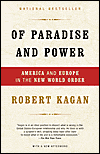August 10, 2004
Of Paradise and Power (book)
Of Paradise and Power: America and Europe in the New World Order
I became aware of this book's existence after reading this article, which draped itself lovingly all over Robert Kagan. I can't say that I disagree too much, though.
By applying principles of psychology on the national level, Kagan is able to make generalizations that do not hold up in the specific case, but nonetheless reflect reality. Several of my favorite passages from the book will speak for themselves:
"When Europeans wept and waved American flags after September 11th, it was out of genuine human sympathy. It was an expression of sorrow and affection for Americans. For better or for worse, European displays of solidarity were a product more of fellow feeling than of careful calculations of self-interest. Europeans' heartfelt sympathy, unaccompanied by a sense of shared risk and common responsibility, did not draw Europeans and American together in strategic partnership. On the contrary, as soon as Americans began looking beyond the immediate task of finding and destroying Osama bin Laden and Al Qaeda to broader strategic goals in the "war on terrorism," Europeans recoiled."
Thesis exposition from the article linked above:
Which brings us to the thesis of this compact, meticulously argued work: that the "paradise" of peace and prosperity Europe now enjoys is made possible, quite simply, by American power. Provided with "security from outside," Europe requires no power of its own; yet protected "under the umbrella of American power," it's able to delude itself that power is "no longer important" and "that American military power, and the 'strategic culture' that has created and sustained it, is outmoded and dangerous." European leaders, says Kagan, see themselves as inhabiting a post-historical world in which war has been rendered obsolete by the triumph of international "moral consciousness"; yet most of them
do not see or do not wish to see the great paradox: that their passage into post-history has depended on the United States not making the same passage. Because Europe has neither the will nor the ability to guard its own paradise and keep it from being overrun, spiritually and well as physically, by a world that has yet to accept the rule of "moral consciousness," it has become dependent on America's willingness to use its military might to deter or defeat those around the world who still believe in power politics.Posted by yargevad at August 10, 2004 07:28 PM